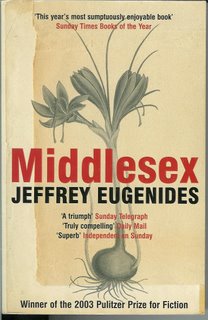About Me

- The Nag
- Niagara on the Lake, Ontario, Canada
- My virtue is that I say what I think, my vice that what I think doesn't amount to much.
Tuesday, May 30, 2006
Spalding Gray Memorial
Monday, May 29, 2006
Gouging Canadian book buyers
Those taxes, before the imminent GST reduction of 1 per cent, amount to 15 per cent in Quebec. No American pays as much tax.
It is apparent to everyone who buys U.S. publications that the Canadian price represents something close to theft in the era of the 90-cent dollar."
Saturday, May 27, 2006
Estate of Mind
At a Manhattan cocktail party in 1931, Dorothy Parker was delighted to meet a writer whose latest novel she had showered with praise. Dashiell Hammett, she said in her New Yorker review of The Glass Key, was as all-American 'as a sawed-off shotgun,' a guy 'so hard-boiled you could roll him on the White House lawn.' Such rapturous compliments seldom appeared in her book column, but she had admired Red Harvest and The Maltese Falcon, and suddenly encountering 'my hero' in person made her drop impulsively to her knees in homage. Hammett took theatrics in the intended spirit-he laughed. Dash's
girlfriend, pouting nearby, was not amused. Afterward she screamed at him for permitting a literary critic to kneel in such a disgusting manner, as if he could have stopped Mrs. Parker, who ordinarily knelt to nobody.
It is unlikely that Parker noticed Hammett's friend, Lil Kober. Most recently a manuscript reader for MGM, she was married to Arthur Kober, screenwriter and one-time press agent. An ambitious twenty-five-year-old of no particular accomplishment, she tended to dwell in the shadows of men, which may be why she failed to make an impression on Parker, a woman accustomed to standing in the spotlight on her own two feet.
Despite that inauspicious beginning at William Rose Benet's party, Parker and Lillian Hellman were destined to become
best friends, their relationship like few others because events took place beyond the grave that even the looniest screenwriter might have rejected.
Thursday, May 25, 2006
What Is the Best Work of American Fiction of the Last 25 Years? - New York Times
Tuesday, May 23, 2006
Create A Darkly Gothic Poem
Sunday, May 21, 2006
Middlesex

This novel sprawls across three generations; it covers the destruction of Smyrna, WW2, the Vietnam War, Watergate and the Detroit riots. There is incest, liquor running and sordid adventures in the skin trade. It is the story of Callie, a pseudohermaphrodite or, if you prefer, a transgendered individual. She grows up in an eccentric Greek immigrant family, hot dog moguls with a closet full of secrets. They are irrepressible and call to mind that other wacky Greco- American clan, the Sedarises . They are quirky but they are Callie's heritage, the source of the recessive fifth gene that leaves her stuck in the middle, neither fish nor fowl. She lives in a house named Middlesex and later in the divided city of Berlin (this is not a subtle novel).
I found the first half of the book heavy going (hard to read but imagine how much harder to write!). I felt weighed down by its epic scope but was forced to push on because it was the only book I had to read in Paris, other than trash left by previous renters of the apartment I was staying in. The second half of the book which focuses on Callie is easier to read. In the end the novel is overly ambitious and tries to tell too many stories but is kept afloat by its humour. It becomes as tangled as the silk threads spun by grandmother Desdemona's silkworms (don't get me started on the contrived segment wherein Desdemona teaches silk production classes at Detroit's first Black Muslim mosque).
Take away the genetic mutation, the talking fetus and the literary allusions and at its heart this is an immigrant saga about a family forced to leave its past behind, a second generation success story and a third generation coming of age tale. As such it doesn't suck.
A lifetime on a slip of paper
Friday, May 19, 2006
Bookman
Tuesday, May 16, 2006
Thirteen Writing Prompts.
BY DAN WIENCEK
- - - -
1.
Write a scene showing a man and a woman arguing over the man's friendship with a former girlfriend. Do not mention the girlfriend, the man, the woman, or the argument.
2.
Write a short scene set at a lake, with trees and shit. Throw some birds in there, too.
3.
Choose your favorite historical figure and imagine if he/she had been led to greatness by the promptings of an invisible imp living behind his or her right ear. Write a story from the point of view of this creature. Where did it come from? What are its goals? Use research to make your story as accurate as possible.
4.
Write a story that ends with the following sentence: Debra brushed the sand from her blouse, took a last, wistful look at the now putrefying horse, and stepped into the hot-air balloon.
5.
A wasp called the tarantula hawk reproduces by paralyzing tarantulas and laying its eggs into their bodies. When the larvae hatch, they devour the still living spider from the inside out. Isn't that fucked up? Write a short story about how fucked up that is.
6.
Imagine if your favorite character from 19th-century fiction had been born without thumbs. Then write a short story about them winning the lottery.
7.
Write a story that begins with a man throwing handfuls of $100 bills from a speeding car, and ends with a young girl urinating into a tin bucket.
8.
A husband and wife are meeting in a restaurant to finalize the terms of their impending divorce. Write the scene from the point of view of a busboy snorting cocaine in the restroom.
9.
Think of the most important secret your best friend has ever entrusted you with. Write a story in which you reveal it to everyone. Write it again from the point of view of your friend. Does she want to kill you? How does she imagine doing it? Would she use a gun, or something crueler and more savage, like a baseball bat with nails in it?
10.
Popular music is often a good source of writing inspiration. Rewrite Bob Dylan's "Visions of Johanna" as a play.
11.
Write a short scene in which one character reduces another to uncontrollable sobs without touching him or speaking.
12.
Your main character finds a box of scorched human hair. Whose is it? How did it get there?
13.
A man has a terrifying dream in which he is being sawn in half. He wakes to find himself in the Indian Ocean, naked and clinging to a door; a hotel keycard is clenched in his teeth. Write what happens next.
Sunday, May 14, 2006
The Year of Magical Thinking

"Life changes fast
Life changes in an instant
You sit down to dinner and life as you know it ends."
Thus begins Joan Didion's chronicle of loss and bereavement. Her husband and dearest friend of forty years died in front of her at the dinner table. Their daughter was hospitalized and comatose at the time. She dissects her grief with the same precision that she applies to all her writing. It is almost elegic in its treatment of John's death and Joan's survival of it. Such public pining could be cringe-inducing but this novel is painstakingly well-shaped and elegant and never, at least to me, self-pitying. I've read everything Joan Didion has written; some of her non-fiction revealed so much of her as a person that, in a sense, I knew her. Reading this book felt a lot like having an honest and difficult discussion with a friend.
Wednesday, May 03, 2006
Mme. Proust and the Kosher Kitchen
 Kate Taylor has written an astonishingly sophisticated debut novel. Three stories, spanning the period from fin de siecle Paris to modern day Toronto, are skilfully braided together. Marie is a young translator trying to come to terms with her failed relationship with Max, son of Holocaust survivor, Sarah. Sarah was smuggled out of France at the age of twelve and placed with a Jewish family in Toronto. Her parents were killed by the Nazis and her life is, of course, forever changed by these events. Mme. Proust is Marcel's mother and Marie is translating her diaries, hoping to ease her own heartbreak through literature. Cultural conflict and alienation are the powerful themes running through the novel but they are handled with subtlety. Mme. Proust and Sarah love their sons but they walk a fine line between nurturing and smothering. The parallels emerge gradually and gracefully. This could have been a confusing novel but Taylor juggles the three perspectives with ease. I'm glad I read it right before going to Paris; Taylor's evocative descriptions of the city have put me in the mood.
Kate Taylor has written an astonishingly sophisticated debut novel. Three stories, spanning the period from fin de siecle Paris to modern day Toronto, are skilfully braided together. Marie is a young translator trying to come to terms with her failed relationship with Max, son of Holocaust survivor, Sarah. Sarah was smuggled out of France at the age of twelve and placed with a Jewish family in Toronto. Her parents were killed by the Nazis and her life is, of course, forever changed by these events. Mme. Proust is Marcel's mother and Marie is translating her diaries, hoping to ease her own heartbreak through literature. Cultural conflict and alienation are the powerful themes running through the novel but they are handled with subtlety. Mme. Proust and Sarah love their sons but they walk a fine line between nurturing and smothering. The parallels emerge gradually and gracefully. This could have been a confusing novel but Taylor juggles the three perspectives with ease. I'm glad I read it right before going to Paris; Taylor's evocative descriptions of the city have put me in the mood.
